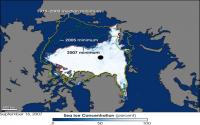Arctic Warming

Quicktabs: Keywords

Predicting when the Arctic will be sea ice free in the summer months has occupied researchers for years. Estimates under high greenhouse gas emissions range from the year 2011 to 2098.
[ More ]
A combined team of researchers from the U.S. and China has projected, using a climate simulation tool, that the Arctic will become September ice-free sometime during the years 2054 to 2058. The group has published a paper describing their methods and findings in Proceedings of the National Academy of Sciences.
[ More ]
Researchers have published their most advanced calculation for the likely impact of melting ice on global sea levels. The EU-funded team says the ice sheets and glaciers could add 36.8cm to the oceans by 2100.
[ More ]
A new international study—done by 47 experts using data from multiple satellites and aircraft—shows that the Earth is losing ice at an ever-increasing rate from both poles. We’ve known for years that the Arctic has been suffering massive ice loss, with the record low broken more than once in recent years. What’s devastating about this new report is that it shows unequivocally and quantitatively that the Antarctic is also losing land ice, with the critical West Antarctica ice sheet losing on average 65 billion tons of ice every year.
[ More ]
Expect more water to lap at your shores. That's the take-home message from two studies out this week that look at the latest data on sea level rise due to climate change. The first shows that current projections for the end of the century may seriously underestimate the rise in global sea levels. The other, on the ice sheets of Greenland and Antarctica, looks at just how much of the water stored up there has been moving into the oceans.
[ More ]
We may be closer to a major climate tipping point than we knew. Earth's permafrost – frozen soil that covers nearly a quarter of the northern hemisphere and traps vast amounts of carbon – may be melting faster than thought and releasing more potent greenhouse gasses.
[ More ]